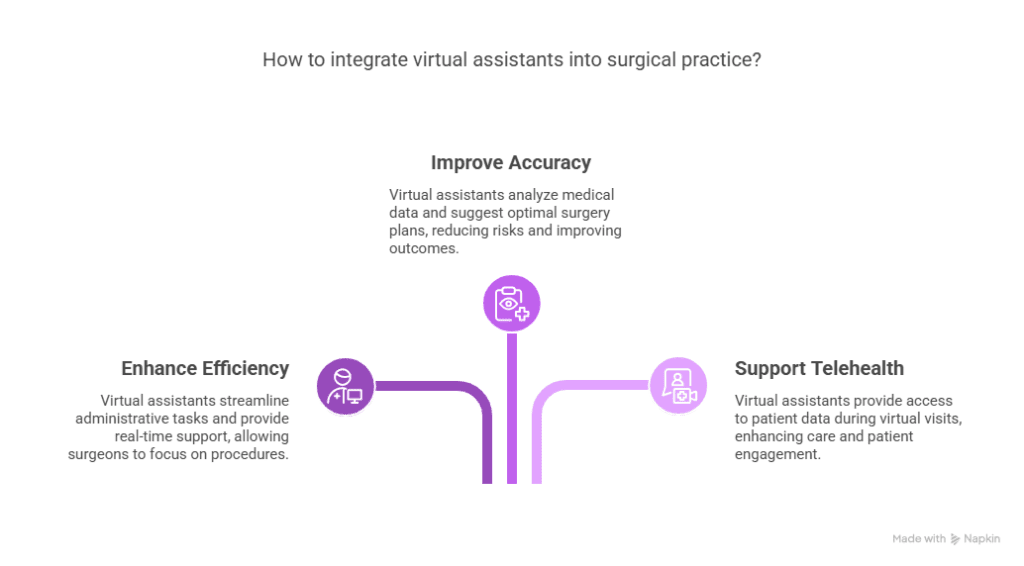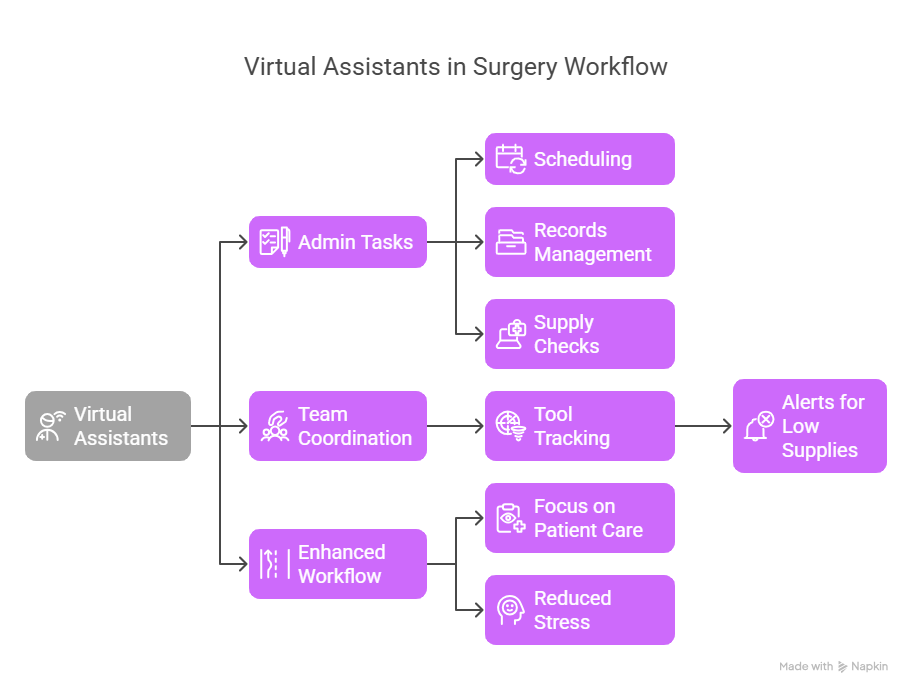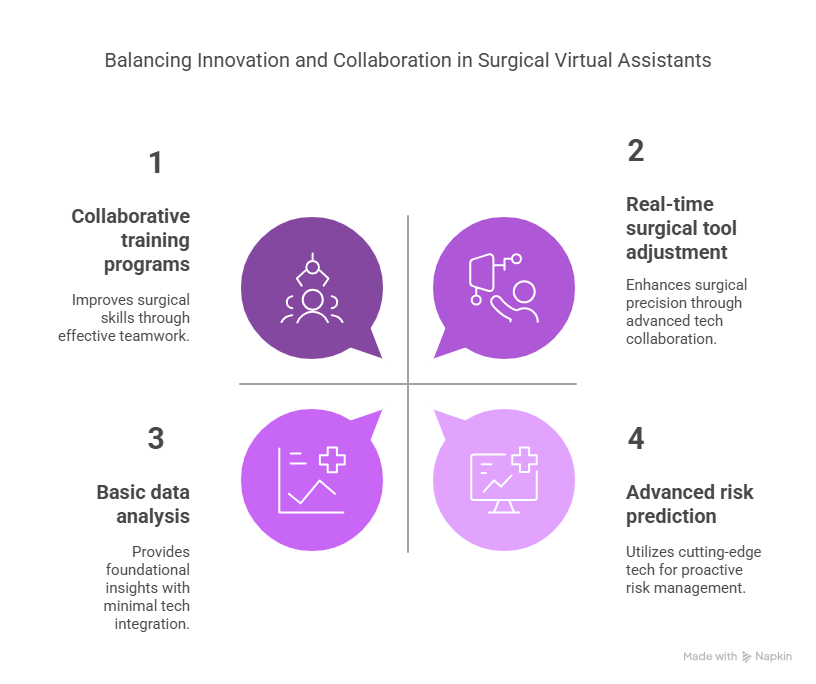The Role of Virtual Assistants for Surgeons
06 May 2025 By: Mary Dellosa
Updated

Technology and human support keep reshaping healthcare. One big shift is using virtual assistants in surgery. They boost precision, cut errors, and ease workflows. They also help improve patient results. This article shows how Remote Virtual Assistants help in surgery, their uses, and the bright future they bring to medicine. In this article, we will talk about why having virtual assistants for surgeons is important.
The Emergence of Remote Virtual Assistants
Virtual assistants help doctors with tasks like admin work and surgery support. Their use grew from the need for speed and accuracy. They aid surgeons by giving key support that helps decisions and smooth procedures.

Understanding the Role of Virtual Assistants for Surgeons
Virtual assistants handle tough tasks and give live support. They read medical data and work with surgery teams. They can check patient records and suggest the best surgery plans.
Adding Remote Virtual Assistants to surgery teams boosts how they work. Surgeons can focus while virtual Assistants handle logistics. This cuts risks and sharpens results by tailoring care to each patient.
Applications in Surgical Settings
Remote virtual assistants help at every step of surgery. Before surgery, they gather data, check risks, and run surgery simulations to prep the team.
A virtual assistant for medical practice also supports telehealth by providing doctors with full access to medical records and critical patient insights during consultations. This boosts care and keeps patients more involved. As healthcare grows, RVAs will play a bigger role in blending tech with patient care.
What Can a Virtual Assistant Do for Surgeons?
Surgeons work under pressure, and every second counts. Remote virtual assistants (RVAs) step in to help. They take on tasks that save time, ease stress, and let surgeons focus on what matters most, caring for patients. Here’s how they support each part of the surgical journey:
1. Before Surgery: Helping the Team Get Ready
Virtual Assistants help surgeons prep without the chaos:
- Gather Patient Info: They pull together medical records, test results, and scans—all in one place.
- Set the Schedule: They book surgeries, avoid double-bookings, and keep everyone in sync.
- Check for Risks: They look at patient data to flag anything that could go wrong.
- Send Reminders: They nudge patients and staff so no one misses an important step.
2. During Surgery: A Steady Hand in the Background
Surgery can be intense. VAs are there to back up the team:
- Watch Vitals: They keep an eye on things like heart rate and alert the team if something’s off.
- Offer Real-Time Info: They give quick access to data that helps the surgeon make smart decisions.
- Track Tools: They make sure everything is clean, in place, and ready to go.
- Guide When Needed: In complex cases, they help by giving prompts or showing visuals.
3. After Surgery: Keeping Recovery on Track
Once the surgery’s done, VAs help patients heal:
- Update Records: They log notes, test results, and follow-up plans.
- Book Follow-Ups: They make sure patients get their next appointment.
- Watch Recovery: They check how patients are doing and catch any warning signs early.
- Send Friendly Reminders: They help patients remember meds or exercises.
4. Behind the Scenes: Keeping Things Moving
Even outside the OR, Virtual assistants help the whole system run smoother:
Help New Staff: They show new team members how to use the tools and stay on track.
- Answer Messages: They help with emails, calls, and simple questions.
- Keep Supplies Stocked: They watch inventory and reorder when things run low.
- Handle Paperwork: They help with billing, insurance, and forms.
Enhanced Workflow Efficiency

Virtual Assistants boost workflow by taking over admin jobs like scheduling, records, and supply checks. This frees staff to focus on patient care. They also link teams and make sure needed tools are ready. In fast-paced surgery, this sharp planning saves time and avoids delays.
For example, virtual assistants track tools in real time and alert teams if anything runs low. This keeps the schedule smooth and stress low. By giving quick updates and easing each surgery step, virtual assistants help teams and patients have a better, safer experience.
Challenges and Considerations
While the benefits of remote virtual assistants are compelling, their integration into surgical practices is not without challenges. Several factors must be considered to ensure their successful implementation and operation.
Data Security and Privacy Concerns
RVA systems deal with sensitive patient data every day. That means hospitals and clinics must make data safety a top priority:
- Strong Protections Needed: Security systems must guard against hacks, breaches, and leaks. One slip can break patient trust.
- Follow the Rules: Healthcare providers must meet strict standards like HIPAA to keep data safe and legal.
- Clear Communication with Patients: People need to know how their info is used. They should be able to say no if they aren’t comfortable.
- Be Ready for Risks: Even with good tech, cyber threats can slip through. That’s why systems must be checked, tested, and updated often.
- Transparency Builds Trust: When patients see that their data is handled with care and honesty, they’re more likely to support the use of RVAs.
Team Training and Buy-In
Getting a new system is one thing, getting people to use it is another:
Build a Culture of Support: Hospitals should highlight how RVAs help the whole team, reduce stress, and improve care.
Learning Takes Time: Surgeons and staff need proper training to feel confident using RVAs.
Some May Resist Change: It’s natural to worry that tech could replace human roles. Showing that RVAs support not replace staff is key.
The Future of Remote Virtual Assistants in Surgery
The future of virtual assistants for surgeons looks strong. As tech and skills grow, Remote virtual assistants will offer sharper, more tailored help to surgeons in changing healthcare settings.

Potential Innovations on the Horizon
Future virtual assistants may use smart tools to spot risks early by studying live and past data. This helps doctors act fast and keep patients safer.
Picture a tool that follows a surgeon’s moves and adjusts gear in real time. This smooth teamwork boosts accuracy and saves time.
Collaboration Between Technology and Human Expertise
Virtual Assistants aren’t here to take over. They’re here to help. When tech and people work together, patients get safer, better care. Doctors and tech teams need to team up to build tools that really help. Training should grow too, so everyone feels ready to use Virtual Assistants.
We also need to talk about privacy and consent. Patients should know what’s happening with their data. Clear rules will help build trust and keep care safe.
Trending Now
Surgeon burnout is a growing crisis fueled by long hours, pressure, and emotional strain. It leads to mental health issues like depression and anxiety, reduces patient care quality, and strains healthcare systems with higher costs and turnover. Causes include workload, administrative tasks, and lack of rest. To solve this, hospitals must support surgeons with better schedules, open mental health support, and reduced admin burdens. Surgeons should also build self-care habits and seek help when needed. System-wide reforms, including training and policy changes, are vital. Solving burnout will help both surgeons and the quality of care they give.
Conclusion
Virtual assistants help make surgeries safer and smoother. They give surgeons key support that leads to better results.
There are challenges, but the benefits are bigger. As healthcare changes, using Virtual Assistants for surgeons will help move surgery forward and improve patient care. In a world that needs speed and accuracy, RVAs lead the way. They’re set to change how surgeries happen and shape the future of healthcare.
As you consider the future of surgical precision and the integration of remote virtual assistants, remember that efficiency and support extend beyond the operating room. HelpSquad Health is here to provide the same level of precision and efficiency for your customer service and back-office needs. With our bilingual agents and services starting at just $8.50 per hour, you can ensure your practice runs smoothly around the clock. Elevate your healthcare services with the professional support you deserve. Start Trial today and experience the difference with HelpSquad Health.


